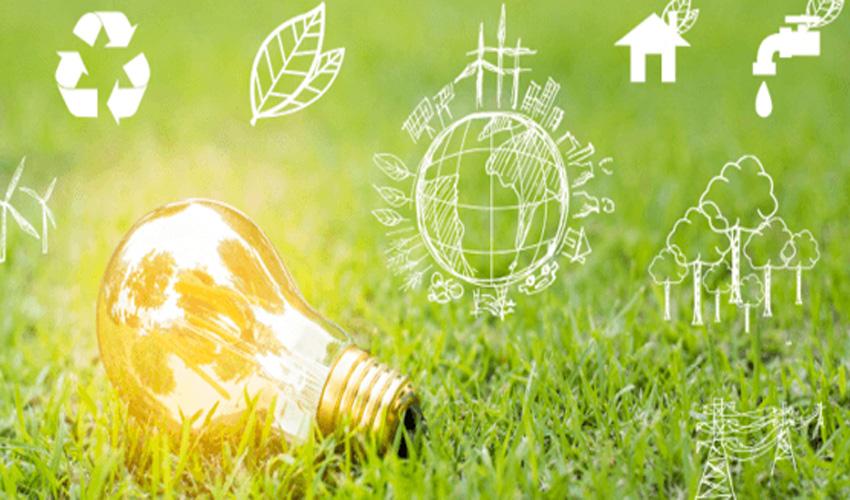As climate change wreaks havoc on the socio-economic landscape, Pakistan is making a significant shift toward green energy, recognizing the critical need for sustainable energy sources.
The government has prioritised this transition as a key component of its long-term energy strategy, aiming to fuel economic growth while addressing accelerating climate challenges.
Govt initiatives driving change
In recent years, the Pakistani government has taken substantial steps to promote renewable energy. One of the most notable initiatives is the State Bank of Pakistan's introduction of favourable financing options for renewable energy projects. This has been a game-changer, encouraging investments in solar and wind energy and facilitating a smoother transition away from traditional energy sources for businesses and households alike.
In addition to financial incentives, the government has reduced interest rates on loans for renewable energy installations. This move has opened doors for small businesses and households to adopt clean energy technologies, making green energy more accessible. Statutory reforms, such as net metering, allow households with solar panels to sell surplus energy back to the national grid, further incentivizing investments in solar power. With these measures in place, Pakistan is on track to meet its target of sourcing 30% of its energy from renewable sources by 2030.
Private sector engagement
The shift towards green energy has also been embraced by the private sector. Last year, a consortium of oil companies made headlines by pledging investments in renewable energy projects within Pakistan. This marks a significant change for traditional energy companies that have historically depended on fossil fuels. Their exploration of solar and wind energy aligns them with the national energy transition strategy, underscoring a profound shift in business dynamics and a recognition of the necessity for sustainable practices.
Among the various renewable energy sectors, solar energy has emerged as a fast-growing industry in Pakistan. The country's geographic location, blessed with abundant sunshine, makes it an ideal candidate for solar power generation.
Recent months have witnessed a notable increase in the installation of rooftop solar systems, especially in urban areas grappling with power shortages and escalating electricity prices. Both residential and commercial consumers are turning to solar power not only for cost savings but also for its reliability amidst frequent power disruptions.
Wind energy has also made considerable strides in recent years. The coastal regions of Sindh and Balochistan, characterized by consistently high wind speeds, have become focal points for wind energy projects.
Wind farms in these areas are contributing to the national grid, offering a cleaner alternative to fossil fuels like natural gas and coal. As the costs of solar and wind technologies continue to decline, these renewable sources are increasingly becoming competitive with conventional energy options, attracting further public and private sector investments.
Challenges ahead in green transition
Despite the progress made, several challenges must be addressed for Pakistan to successfully transition to green energy in the long term. One of the critical hurdles is the outdated energy infrastructure. The national grid, designed around traditional energy sources, lacks the capability to accommodate the variable output from renewable sources like wind and solar.
This creates bottlenecks, especially during peak demand hours when renewable energy generation may not align with consumption needs. Until the grid is modernized, the potential for renewable energy to contribute significantly to Pakistan's electricity supply will remain limited.
Implementation of green energy policies has also faced hurdles. While supportive policies exist, their execution is often slow and inconsistent. The net metering system, intended to encourage solar power adoption, has encountered resistance from some power distribution companies fearing revenue loss as more consumers become energy producers. This resistance hampers the adoption of renewable energy technologies, particularly in provinces where the execution of federal policies is weak.
Another barrier is the financial challenge of entry. Although the State Bank's financing options have reduced costs, the upfront investment for solar and wind installations remains prohibitively high for many households and small businesses. Increased awareness campaigns and further financial incentives are vital to overcoming this obstacle and promoting broader adoption of renewable energy solutions.
Pakistan's geographic diversity also presents substantial hydropower potential that remains largely untapped. The northern regions, home to numerous rivers and streams, offer significant opportunities for both large- and small-scale hydropower projects. Recently developed small hydropower plants in rural areas have provided clean energy to off-grid communities, addressing the rural energy crisis while alleviating pressure on the national grid.
However, the development of large-scale hydropower projects has been sluggish due to high initial costs and lengthy approval processes. Major projects like the Diamer-Bhasha and Mohmand dams are expected to significantly boost Pakistan’s hydropower capacity upon completion. These projects will not only ensure a reliable energy source but also address critical water storage issues, helping Pakistan cope with the increasing frequency of droughts and floods exacerbated by climate change.
Economic and environmental benefits
The green energy initiatives not only promise environmental benefits but also present substantial economic opportunities. Renewable energy projects, particularly in solar and wind, create jobs in manufacturing, construction, and project management sectors. As demand for clean energy technologies rises, these industries are poised for growth. By reducing its reliance on imported fossil fuels, Pakistan can improve its trade balance and lessen the financial strain caused by fluctuating global oil prices.
The environmental advantages of expanding renewable energy use are equally significant. By increasing its share of renewable energy, Pakistan can lower carbon emissions and enhance air quality, particularly in urban areas. This shift will have long-term public health benefits, reducing the prevalence of respiratory diseases and other pollution-related health issues. Additionally, enhancing the country’s green energy projects will help Pakistan meet its international climate commitments as outlined in the Paris Agreement.
While Pakistan’s journey toward renewable energy is still in its early stages, the progress observed in recent years is encouraging. The supportive government policies, coupled with increasing private sector investments, are paving the way for a future where green energy can play a vital role in powering the nation. As challenges persist, continued collaboration between the government and private sector, along with innovative solutions and public awareness, will be critical in realizing a sustainable energy future for Pakistan.


























